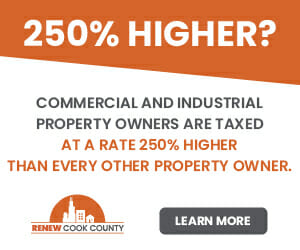Property Tax Valuations
Values of Chicago commercial office buildings are affected by many factors. Investors are particularly sensitive to certain factors when analyzing an office building for acquisition, and the focus and weight placed on such factors differs – at times dramatically – from the valuation factors that Cook County assessment officials have historically thought important.
This divergence of valuation criteria and focus has fostered misunderstandings and some disillusionment with the Cook County property tax system. For example, typical Buyers and Sellers of major commercial office buildings generally place little importance on arbitrary building classifications (A, B, or C) and are suspicious of reported capitalization rates resulting from sales.
The County’s reliance on building classifications and reported capitalization rates breeds distrust because the classification or grading of buildings by a lettering system is flawed; building desirability and value no longer rests on the large size, age, or architectural significance or distinctiveness of a building.
Consequently, the Cook County classification system is a poor indicator of value differentiations and is a poor methodology of drawing distinctions among the value of significant Chicago commercial office properties. Likewise, because capitalization rates are subject to multiple, unique variables, raw capitalization rates reported in the market are often not verifiable or independently reliable.
Private sector investors consider the listed factors and other quantifiable factors when valuing multi-tenant, commercial office buildings. The major factors most important to investors generally fall into the following categories:
- Quality of Rent Roll
- Encumbrances on Rental Space (actual and potential)
- Market Conditions
- Age and Condition of Improvements
- Buyer & Seller Motivations
- Quantity and Quality of Vacant Space
- Time Frame to Lease Up Existing Vacant Space
- Obstacles to New Development
BOMA/Chicago continues to advocate for changes in the assessment process to reflect market realities which would produce a more accurate valuation of commercial real estate.

